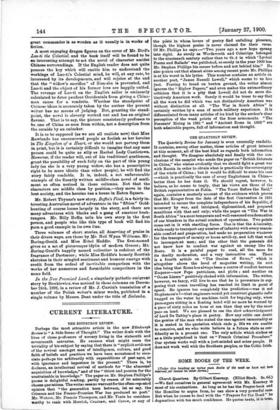CURRENT LITERAT URE.
TEE EDINBURGH REVIEW.
Perhaps the most attractive article in the new Edinburgh Review is " A Side Scene of Thought." The writer deals with the lives of three professors of sorcery living in the sixteenth and seventeenth centuries. He excuses what might seem the triviality of his subject by saying that there is "explicit evidence of the revival amongst men of intelligence, culture, and good faith of beliefs and practices we have been accustomed to asso- ciate perhaps too arbitrarily with superstitions of past ages, or with ignorance and imposture in the present." There is, be declares, an intellectual revival of methods for " the abnormal acquisition of knowledge," and of the " thirst and passion for the unattainable in knowledge." The paper on Mr. Stephen Phillips's poems is delightful reading, partly by reason of its admirably chosen quotations. The writer sees no warrant for the often-repeated opinion that " the generation born between, let us say, the Crimean and the Franco-Prussian War has produced no poet." Mr. Watson, Mr. Francis Thompson, and Mr. Yeats he considers worthy to rank with Herrick, Crashaw, and Carew, or any of
the pieta in whom lovers of poetry find unfailing pleasure, though the highest praise is never claimed for their verse.
Of Mr. Phillips he says Two years ago a new hope sprang into sight. As surely as Wordsworth and Coleridge belonged to the nineteenth century rather than to th .t in which 'Lyrical Poems and Ballads' was published, so surely in the year 1900 has Mr. Stephen Phillips his career before and not behind him." Ho also points out that almost alone among recent poets Mr. Phillips is at his worst in his lyrics. This number contains an article on another poet, "James Russell Lowell," which seems to us less just. Fearing to tread on beaten ground, the writer almost ignores the " Biglow Papers," and even makes the extraordinary criticism that it is a pity that Lowell did not do more dis- tinctively American work. Surely it would be truer to say that all the work he did which was not distinctively American was without distinction at all. "The War in South Africa" is certainly written by a man of much military experience. It is differentiated from many articles of its kind by the author's clear perception of the weak points of the Boer armaments. "The Peasants' Rising in 1381" and "Ancient Rome in 1200" are both admirable papers, full of information and thought.


















































 Previous page
Previous page